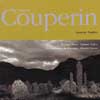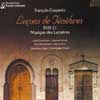Couperin (3) Leçons de Ténèbres; Lalande Psalm 50
Two very different approaches to Couperin – one dramatic, one with poise
View record and artist detailsRecord and Artist Details
Composer or Director: Michel-Richard de Lalande, François Couperin
Genre:
Vocal
Label: Assai
Magazine Review Date: 13/2003
Media Format: CD or Download
Media Runtime: 58
Mastering:
Stereo
DDD
Catalogue Number: 222412

Tracks:
| Composition | Artist Credit |
|---|---|
| (3) Leçons de ténèbres |
François Couperin, Composer
(Le) Parlement de Musique François Couperin, Composer Kirsten Blase, Soprano Martin Gester, Organ Salomé Haller, Soprano |
| Miserere mei Deus secundum |
Michel-Richard de Lalande, Composer
(Le) Parlement de Musique Kirsten Blase, Soprano Martin Gester, Organ Michel-Richard de Lalande, Composer Salomé Haller, Soprano |
Composer or Director: Gérard Pesson, François Couperin
Genre:
Vocal
Label: K617
Magazine Review Date: 13/2003
Media Format: CD or Download
Media Runtime: 58
Mastering:
Stereo
DDD
Catalogue Number: K617146

Tracks:
| Composition | Artist Credit |
|---|---|
| (3) Leçons de ténèbres |
François Couperin, Composer
François Couperin, Composer Jean-Christophe Frisch, Flute XVIII-21 Musique des Lumières |
| Contra me (miserere) |
Gérard Pesson, Composer
Gérard Pesson, Composer Jean-Christophe Frisch, Flute XVIII-21 Musique des Lumières |
Author: Stanley Sadie
In the new spirit these days of early music-making, neither of these discs is quite like that. Indeed the version by XVIII-21 Musique des Lumières is very dramatically, very consciously, projected – sung in what might almost be called a flamboyant style. But then, here they are not presented as Louis XIV would have heard them. The recording evidently arose from dramatic performances given in Besançon in 2001. In place of the plainchant framework, they have here a prefatory vocal improvisation by Marco Horvat, responses in the form of an Arab lament for Jerusalem (by Rachid Benabdeslam) and a Jewish lament from Polish sources (sung by Horvat), and in place of the final Miserere a short new composition by Gérard Pesson, Contra me, built of fragments from the psalm beginning with the word ‘Miserere’.
While I can sympathise with the thinking behind this composite work, I am not really convinced that it holds together, at least not without the visual element that originally belonged to it. The singing of the Couperin is impassioned, especially from Stéphanie Révidat, bright and full in tone, vehement in expression, the detail of the lines sharply etched; Cyrille Gerstenhaber is perhaps more skilful at the broader shaping of the lines and rather less emphatic in manner. The dynamic changes are strongly marked though the logic behind them sometimes eluded me.
Le Parlement de Musique seem to me to capture the essential style of the leçons more surely, with singing more poised, more in keeping with the dignity of the occasion, from Kirsten Blase and also from Salomé Haller, who brings careful, shapely singing and a feeling for the long lines to the second leçon; the continuo playing, too, gives a good sense of flow towards the cadences. There is also some passion here, for example in the long setting of ‘Lamed’ in the third leçon, which is for two voices. Perhaps the treatment of linear detail here is not quite as precise as on the other CD. But the prefatory words and the response are sung in plainchant, which of course gives the leçons a much more appropriate context. The final Miserere is apparently a setting by Lalande, arranged by Brossard.
That however is left unexplained and not properly identified: the only reference to it is on the back of the CD case – it is not mentioned in the booklet. Both these booklets seem to me unsatisfactory and inconsiderate to the listener in their treatment of the text: the first prints French and English translations of the leçons but not the Latin that is sung; the second prints the Latin and a French version but not on the same page (and no English). Musically, however, the Parlement de Musique recording is certainly to be preferred.
Discover the world's largest classical music catalogue with Presto Music.

Gramophone Digital Club
- Digital Edition
- Digital Archive
- Reviews Database
- Full website access
From £8.75 / month
Subscribe
Gramophone Full Club
- Print Edition
- Digital Edition
- Digital Archive
- Reviews Database
- Full website access
From £11.00 / month
Subscribe
If you are a library, university or other organisation that would be interested in an institutional subscription to Gramophone please click here for further information.




